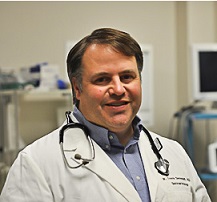 W. Travis Dierenfeldt, MD, a solo gastroenterologist in private practice shares his thoughts on how healthcare consolidation and reform are affecting the field.
W. Travis Dierenfeldt, MD, a solo gastroenterologist in private practice shares his thoughts on how healthcare consolidation and reform are affecting the field. W. Travis Dierenfeldt, MD, is a solo, private practice physician board-certified in gastroenterology. Dr. Dierenfeldt's Manhattan, Kan., practice includes himself and a physician's assistant. He performs procedures at an ambulatory surgery center and a hospital. Here he shares his thoughts on how healthcare consolidation has affected his practice, how he has prepared his practice for the changes of healthcare reform and weighs the benefits of remaining solo instead of choosing employment.
Question: How has healthcare consolidation affected the field of solo gastroenterology practice?
Dr. Travis Diernfeldt: I am a solo practitioner and I have been in private practice for 14 years. In general it seems many practices across the country are becoming hospital owned, but here in Manhattan, Kansas we seem to be one of the last spots touched. Here, most of our primary care physicians and specialists remain independent. Over the last six months to a year, I have been looking to the future, but as healthcare reform moves forward few us know what that will mean.
Q: What have you done to adapt to changes in healthcare and prepare for the future?
TD: Four years ago, I made the switch to electronic medical records. I am fairly tech savvy and making the switch was not that difficult. As I am doing procedures, whether in the hospital or ambulatory surgery center, I have access to all of my patients' information. I have also outsourced my practice's billing and human resources to third parties.
Q: As a solo physician, what have you found to be some of the greatest challenges in today's healthcare market?
TD: Though the switch to EMR has been beneficial, it has still been a struggle to reach meaningful use requirements. There are so many hoops to jump through. As a solo physician, I can't hire an office manager and I have to keep up with all the rules and regulations as they come through. Quality reporting is becoming a burden as I work to make sure I don't inadvertently miss anything and shoulder the additional costs it brings to my practice.
Q: Have you considered employment as an option?
TD: I have looked at employment options elsewhere. There is currently a shortage of gastroenterologists, so it would not be difficult to find a job in a desirable location.
Q: What do you think are a few of the benefits of choosing physician employment?
TD: As an employed physician, you would no longer be charged with employee management and the burden and frustration of negotiating with payers would be out of your hands. The latter would certainly be the biggest advantage.
Q: What are the downsides of leaving private practice for employment?
TD: As a solo physician and business-owner, it would be difficult to give up the level autonomy I currently have. Right now, I make my own schedule and have the freedom to take time off if I need it. I also run a membership-based IBS (Irritable Bowel Syndrome) website Low FODMaP IBS Diet to help patients manage their IBS symptoms through diet and lifestyle changes. It is not a big earner, more of a hobby, but choosing employment would limit my outside activities like this.
More Articles on Gastroenterology:
AGA, ACG, ASGE Partner to Protest Payment Cuts to GI/Endoscopy Procedures
Top 10 Issues in Gastroenterology for 2013
9 Statistics on Digestive Disease Care & Costs in the US


